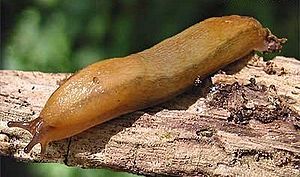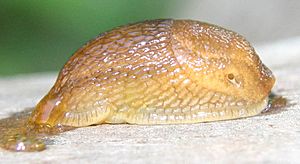Arion fuscus facts for kids
Quick facts for kids Arion fuscus |
|
|---|---|
 |
|
| An active individual from the Netherlands | |
 |
|
| A contracted individual of Arion fuscus from the Czech Republic | |
| Conservation status | |
|
NE
|
|
| Scientific classification |
|
| Kingdom: | Animalia |
| Phylum: | Mollusca |
| Class: | Gastropoda |
| Subclass: | Heterobranchia |
| Clade: | Euthyneura |
| Order: | Panpulmonata |
| Clade: | Eupulmonata |
| Clade: | Stylommatophora |
| Family: | Arionidae |
| Genus: | Arion |
| Species: |
A. fuscus
|
| Binomial name | |
| Arion fuscus (O.F. Müller, 1774)
|
|
| Script error: The function "autoWithCaption" does not exist. | |
| Synonyms | |
|
Arion subfuscus (Draparnaud, 1805) |
|
Script error: No such module "Check for conflicting parameters".
Arion fuscus, also known as the "Dusky Arion", is a small, air-breathing land slug. It's a type of mollusk that lives on land. These slugs belong to a group called Arionidae, which are known as roundback slugs.
Sometimes, you might hear about Arion subfuscus. This slug is very similar to Arion fuscus. Some scientists even think they are the same species. They look alike and live in similar places in Europe. Arion fuscus is found across Central, North, and East Europe. Arion subfuscus mostly lives in West Europe. It can be hard to tell them apart without special tests.
What Does It Look Like?
The Dusky Arion is a roundback slug that can grow to be about 50 to 70 millimeters long. That's about the length of your thumb! Its body color can be different shades of brown. You might see them in black-brown, olive-brown, orange, or even bright reddish-orange.
These slugs usually have darker bands along their sides. A dark mark often reaches from their back to the front, right under their breathing hole. The edge of their foot is usually pale with thin lines. The bottom of their foot, called the sole, is a light, see-through color. Their tentacles can be either light or dark.
When you touch a Dusky Arion, it doesn't curl up into a bell shape. One special thing about this slug is its mucus. Unlike many other slugs, the Dusky Arion produces a yellow-orange slime!
Where Does It Live?
This slug is found in many countries across Europe and Asia. You can find them in places like:
And many other areas too!
Its Home
The Dusky Arion likes to live in woodland areas. You can often find them hiding under fallen logs or under the bark of trees. But they are also happy in other places. They can live in hedges, gardens, pastures (like fields where animals graze), and even dunes near the coast.
 | Mary Eliza Mahoney |
 | Susie King Taylor |
 | Ida Gray |
 | Eliza Ann Grier |

